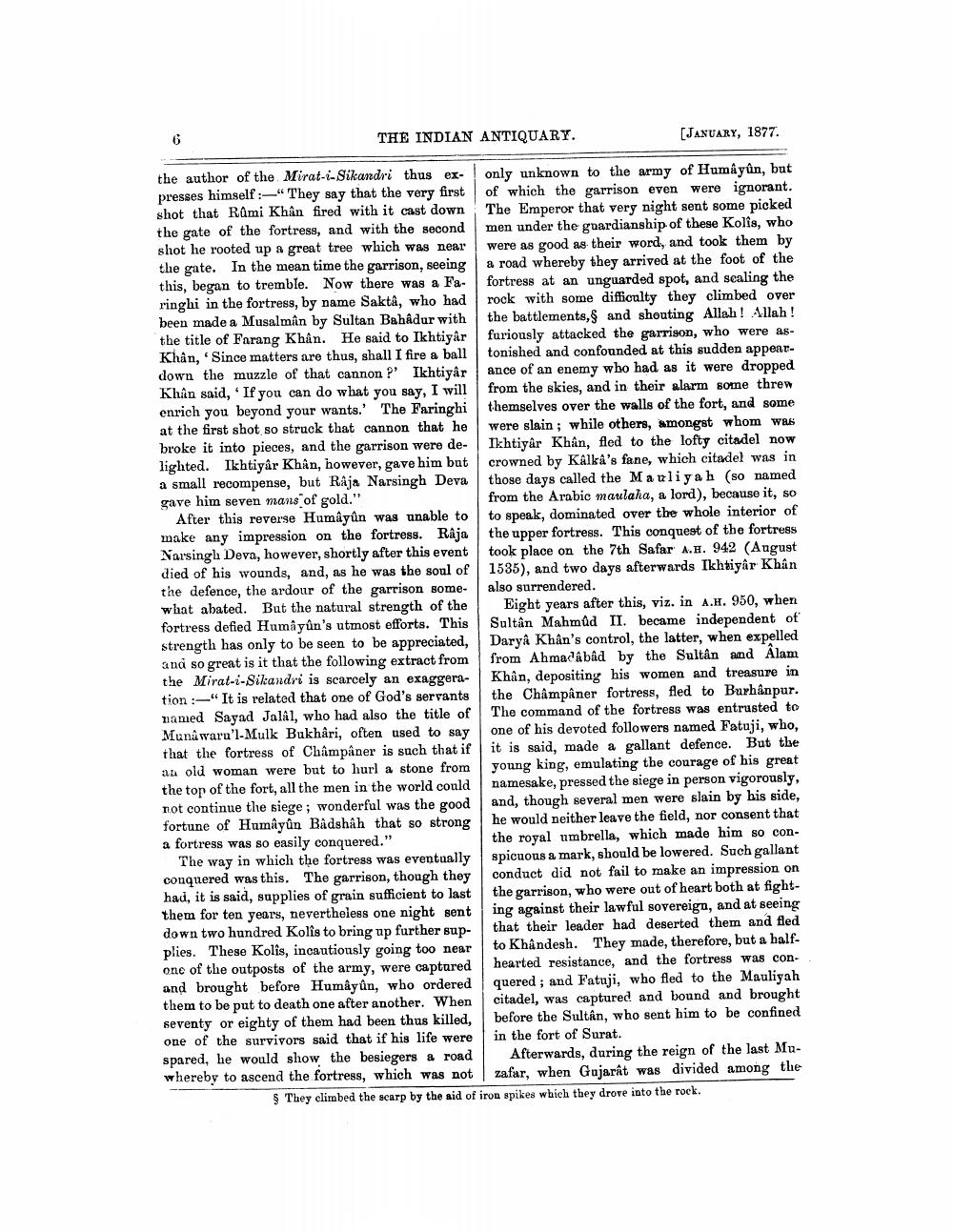________________
6
THE INDIAN ANTIQUARY.
the author of the Mirat-i-Sikandri thus expresses himself:-"They say that the very first shot that Rami Khân fired with it cast down the gate of the fortress, and with the second shot he rooted up a great tree which was near the gate. In the mean time the garrison, seeing this, began to tremble. Now there was a Faringhi in the fortress, by name Saktâ, who had been made a Musalman by Sultan Bahadur with the title of Farang Khân. He said to Ikhtiyâr Khân, 'Since matters are thus, shall I fire a ball down the muzzle of that cannon ?' Ikhtiyâr Khân said, 'If you can do what you say, I will enrich you beyond your wants.' The Faringhi at the first shot so struck that cannon that he broke it into pieces, and the garrison were delighted. Ikhtiyâr Khân, however, gave him but a small recompense, but Râja Narsingh Deva gave him seven mans of gold."
[JANUARY, 1877.
only unknown to the army of Humâyûn, but of which the garrison even were ignorant. The Emperor that very night sent some picked men under the guardianship of these Kolîs, who were as good as their word, and took them by a road whereby they arrived at the foot of the fortress at an unguarded spot, and scaling the rock with some difficulty they climbed over the battlements,§ and shouting Allah! Allah! furiously attacked the garrison, who were astonished and confounded at this sudden appearance of an enemy who had as it were dropped from the skies, and in their alarm some threw themselves over the walls of the fort, and some were slain; while others, amongst whom was Ikhtiyâr Khân, fled to the lofty citadel now crowned by Kâlkâ's fane, which citadel was in those days called the Mauliyah (so named from the Arabic maulaha, a lord), because it, so to speak, dominated over the whole interior of the upper fortress. This conquest of the fortress took place on the 7th Safar A.H. 942 (August 1535), and two days afterwards Ikhtiyâr Khân also surrendered.
After this reverse Humâyûn was unable to make any impression on the fortress. Raja Narsingh Deva, however, shortly after this event died of his wounds, and, as he was the soul of the defence, the ardour of the garrison somewhat abated. But the natural strength of the fortress defied Humâyûn's utmost efforts. This strength has only to be seen to be appreciated, and so great is it that the following extract from the Mirat-i-Sikandri is scarcely an exaggeration:"It is related that one of God's servants named Sayad Jalâl, who had also the title of Munawaru'l-Mulk Bukhâri, often used to say that the fortress of Châmpâner is such that if an old woman were but to hurl a stone from the top of the fort, all the men in the world could not continue the siege; wonderful was the good fortune of Humâyûn Badshah that so strong a fortress was so easily conquered."
Eight years after this, viz. in A.H. 950, when Sultan Mahmûd II. became independent of Darya Khân's control, the latter, when expelled from Ahmadâbâd by the Sultan and Alam Khân, depositing his women and treasure in the Châmpâner fortress, fled to Burhanpur. The command of the fortress was entrusted to one of his devoted followers named Fatuji, who, it is said, made a gallant defence. But the young king, emulating the courage of his great namesake, pressed the siege in person vigorously, and, though several men were slain by his side, he would neither leave the field, nor consent that the royal umbrella, which made him so conspicuous a mark, should be lowered. Such gallant conduct did not fail to make an impression on the garrison, who were out of heart both at fighting against their lawful sovereign, and at seeing that their leader had deserted them and fled to Khândesh. They made, therefore, but a halfhearted resistance, and the fortress was conquered; and Fatuji, who fled to the Mauliyah citadel, was captured and bound and brought before the Sultân, who sent him to be confined in the fort of Surat.
The way in which the fortress was eventually conquered was this. The garrison, though they had, it is said, supplies of grain sufficient to last them for ten years, nevertheless one night sent down two hundred Kolis to bring up further supplies. These Kolis, incautiously going too near one of the outposts of the army, were captured and brought before Humâyân, who ordered them to be put to death one after another. When seventy or eighty of them had been thus killed, one of the survivors said that if his life were spared, he would show the besiegers a road whereby to ascend the fortress, which was not § They climbed the scarp by the aid of iron spikes which they drove into the rock.
Afterwards, during the reign of the last Muzafar, when Gujarat was divided among the




